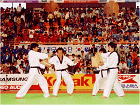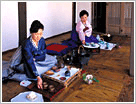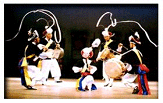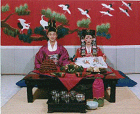|
LANGUAGE
The official language of the symposium will be
English and all papers should
be written and presented in English. No
facility of simultaneous interpretation
will be available on site.
CUSTOMS
An oral and written declaration for baggage must be
made to the customs officer
upon entry.
VACCINATION and
HEALTH
Vaccination certificates are not required for
admission to the Republic of Korea.
Participants are advised to take
out insurance coverage for personal accidents
and medical
expenses.
CLIMATE
Jeju island's average temperature in December ranges from
6.5°C to 8.0°C.
CURRENCY
The unit of Korean
currency is the Won(indicated as£Ü).
Coin denominations are
10, 50, 100, and 500. Bank notes of 1,000, 5,000,
and 10,000 are frequently used.
The exchange rate is subject to change
with market fluctuations.
ELECTRICITY
In Korea, most of buildings have outlets for 220
volts only. Occasionally, outets for
both 100 and 220 volts are
available. Always check the power supply before using
electric
equipment.
EMERGENCY
Dial 119 for the fire and ambulance, and 112 for the
police.
 Korean Foods Korean Foods
|
    |
|
GALBI |
|
|
Galbi-gui is an excellent method for cooking short ribs according
to Korean tradition.
The short ribs are marinated over-night, and grilled
over a charcoal or gas fire at
the table. At restaurants, a hostess usually
assists by cutting the cooked short ribs
into bite-sized
pieces. |
|
BIBIM-BAP |
|
|
Bibim-bap is a bowl of hot rice
and pan-fried meat garnished with a variety of
vegetables. As the word,
'bibim', or to 'stir together' indicates, the dish is eaten
after stirring
the rice and vegetables together with a dollop of hot pepper paste
sauce.
And Dolsot Bibim-bap is cooked and served in a dolsot, or a stone pot, the
insulating capacity of the stone keeps your food warm until the last
bite. |
|
GIMCHI |
|
|
Gimchi, or vegetables salted and fermented for long
storage, is the most important
component of a Korean meal, and dates back
almost a thousand years. According
to recent scientific research, gimchi is
particularly rich in vitamins and minerals.
Gimchi produces natural acids
during the fermentation process, which stimulate the
appetite, as well as
clean the intestines with lactic acid. Gimchi comes in a variety
of flavors,
depending on its main ingredients and the preparation method. There
are more
than 100 types of gimchi. |
|
RICE CAKE and KOREAN
COOKIES |
|
|
Tteok is traditional Korean cake made from rice powder.
Koreans prepare it for festive
occasions such as birthdays and weddings as
well as for ancestral memorial services.
Hangwa or Korean Cookies are
appreciated for its artistic and decorative colors and
patterns as well as
for its pleasing sweet taste. |
 Traditional Activities Traditional Activities
|
TAEGWONDO |
|
 |
Taegwondo is Korean traditional
martial art for men and women
of all ages. It helps people keep their health
through studying
the skills of defense and offense. Taegwondo has been in
existence for thousands of years and is practiced as both a
method of
self-defense. Its benefits, long known by Koreans,
|
|
|
are being spread around the world
by over 4,000 masters |
|
who are actively teaching
Taegwondo in other countries.
There are about 50,000,000 Taegwondo students
all over
the world.
|
|
DADO |
|
 |
In the west, several traditional beverages such as hot
cocoa
and hot spiced cider are popular. In Korea, green tea is the
most
popular traditional beverage. From ancient times there
has been a tradition
of serving green tea for guests in Korea.
The etiquette for preparing,
serving and drinking tea is known
as the "Dado" tea ceremony - "Da" implies
tea and "do" is the
|
|
|
art of making or doing something. When pouring tea into
cups |
|
after brewing, you are not supposed to immediately fill
the cup.
Rather you pour a little into each cup in turn and then go around
again because the flavor and color of the tea get stronger as
time
passes.
|
|
PUNGMUL |
|
 |
Pungmul is a
grand outdoor performance of Korean folk music in
which dances, songs, and
dramas are intermingled. It is roughly
equivalent to a western musical, but
has very different origins
and aims. Performing pungmul expresses wishes for
a rich
harvest of grain and a good catch of fish. It also promotes amity
|
|
|
and
solidarity among villagers, while encouraging cooperation
|
|
and a sense
of identity as Koreans.
|
|
TRADITIONAL MARRIGE |
|
 |
As in any
culture, marriage in Korea represents one of the major
stages of ones life.
The traditional ceremonies surrounding the
event have deep Confucian roots,
symbolizing the importance
of the families involved. Ceremonies have some
differences
according to the region where they are performed and the
social |
|
|
status of the
participants, but they all follow the same basic |
|
format.
| |